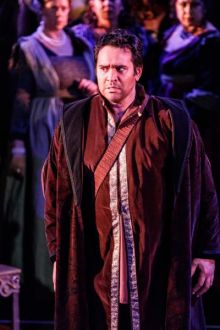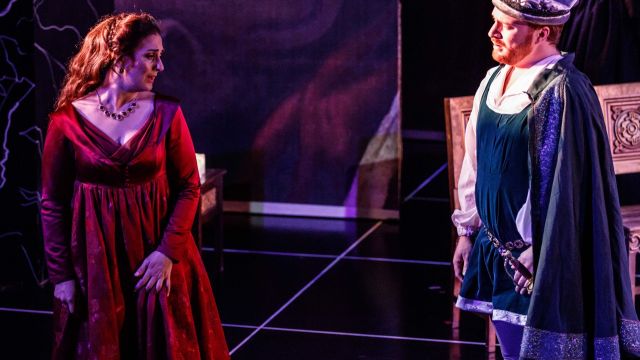Otello
Rossini's retelling of Otello centres firmly around Desdemona, who acts as the moral heart of the opera. In this version she is secretly married to Otello, and has been wronged by her father, who gave her love note and lock of her hair to Rodrigo, supposing him to be the object of her affections. He promises her to Rodrigo; and both men are encouraged in this by Iago, who is himself a rejected suitor.
Iago's primary plan to is to bring about Desdemona's downfall, with Otello as collateral damage; but he miscalculates when he underestimates Otello's furiously passionate nature.
The opening scene where the Doge (sung with magisterial surety by Jason Wasley) celebrates Otello's successes sets the tone of the opera: the Doge's powerful and benevolent patronage contrasted with the machinations of the conspirators. Iago's and Rodrigo's racism is blatant and virulent, horrified that Otello (the "upstart") is considered a son of Venice.
The scene was cleverly set using projections of paintings of Venice and other italian art of the period, adding lush colour as a counterpoint to the black marble floors and columns of the set.

Opulent costumes added to the picture of a wealthy, successful city-state; and the calm dignity of the chorus added gravitas at key moments.
Dimity Shepherd was an assured stage presence in the rather thankless role of Emilia, Desdemona's companion. Her warm mezzo voice added depth and beauty to several complex ensembles; and Emilia's obvious compassion for her friend acted as a counterweight to the men who supposedly love Desdemona.
Peter Tregear - stepping in for Roger Howell - did an excellent job as the blustery, intractable Elmiro Veneto, Desdemona's father, his solid bass-baritone voice more than equal to the role.
Stephen Smith portrayed the intensity and passion of Otello very clearly; but seemed underpowered vocally. However his commanding stage presence made him a force to be reckoned with, and Otello's influence was felt in every scene.
Boyd Owen made a splendid Rodrigo, a substantial role with a redemptive arc. His bright and flexible tenor voice was well-suited to the demands of the role, and he did much of the vocal heavy lifting as a pivotal character in multiple scenes and ensembles.
Henry Choo was suitably Saturnine and vicious as Iago, with beautiful, mellifluous singing a stark contrast to Iago's unflinching manipulations to achieve nefarious ends.
But the undisputed star of the opera was Elena Xanthoudakis as Desdemona, her warm, luminous soprano voice navigating the demanding bel canto bravura passages with consummate ease. Ms Xanthoudakis perfectly portrayed Desdemona's wronged innocence and the strength of her love for Otello. Her tireless singing shone in the ensembles; and the "Willow Song" aria, with simple and beautiful harp accompaniment, was a particular highlight.
 Desdemona is surrounded by hectoring men who insist on telling her how she feels, what she did, and what she should do. That she resists them, only to die at the hands of a jealous husband due to their machinations is the true tragedy of the opera. Desdemona's death scene is particularly confronting to modern sensibilities, beginning when Otello sneaks into her bedroom, and very carefully and quietly locks the door. Iago and Rodrigo miscalculate when they advise him simply to spurn her, reckoning without Otello's passionate nature and arrogant defence of his 'honour'.
Desdemona is surrounded by hectoring men who insist on telling her how she feels, what she did, and what she should do. That she resists them, only to die at the hands of a jealous husband due to their machinations is the true tragedy of the opera. Desdemona's death scene is particularly confronting to modern sensibilities, beginning when Otello sneaks into her bedroom, and very carefully and quietly locks the door. Iago and Rodrigo miscalculate when they advise him simply to spurn her, reckoning without Otello's passionate nature and arrogant defence of his 'honour'.
The Melbourne Opera orchestra under the baton of Greg Hocking had issues with their general ensemble at the beginning of the night, but handled the flourishes and emotional demands of Rossini's score as the opera progressed.
The strength of Rossini's writing was best showcased in the many different ensembles - including tenor duets - which highlighted all of the different colours of the tenor voice.
Alex Armstrong
Photographer: Robin Halls
Subscribe to our E-Newsletter, buy our latest print edition or find a Performing Arts book at Book Nook.

